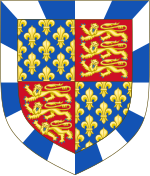Henry Beaufort, Duke of Somerset
| The Duke of Somerset | |
|---|---|

Coat of arms of Beaufort
|
|
| Born | 26 January 1436 |
| Died | 15 May 1464 (aged 28) |
| Noble family | House of Beaufort |
|
Issue
Charles Somerset, 1st Earl of Worcester (legitimised)
|
|
| Father | Edmund Beaufort, 2nd Duke of Somerset |
| Mother | Lady Eleanor Beauchamp |
Henry Beaufort, 3rd Duke of Somerset (26 January 1436 – 15 May 1464) was an important Lancastrian military commander during the English Wars of the Roses. He is sometimes numbered the 2nd Duke of Somerset, because the title was re-created for his father after his uncle died. He also held the subsidiary titles of 5th Earl of Somerset, 2nd Marquess of Dorset and 2nd Earl of Dorset.
Somerset, born about January 1436, was the son of Edmund Beaufort, 2nd Duke of Somerset, and Eleanor, daughter of Richard Beauchamp, Earl of Warwick and widow of Thomas, fourteenth baron Roos of Hamlake. From 1443 to 1448 Henry was styled Earl of Mortain or Morteign, and from 1448 to 1455 Earl of Dorset. While still a youth he fought at the First Battle of St Albans (1455), where he was wounded and his father was killed; thereby he inherited the title of 3rd Duke of Somerset.
He was regarded as "the hope of the [Lancastrian] party", but he also inherited the "enmities entailed upon him by his father's name". He was brought to the council at Coventry, where in October 1456 an effort was made to reconcile the two parties; but the meeting was disturbed by quarrels between Somerset and Warwick, and by a brawl between Somerset's men and the town watch of Coventry. In 1457 Queen Margaret of Anjou suggested a marriage between Somerset and his cousin Joan, sister of James II of Scotland, but the proposal came to nothing. On 14 October of that year Somerset was made lieutenant of the Isle of Wight and warden of Carisbrooke Castle. Early in 1458 he took part in the council at London which again endeavoured to effect a political reconciliation, and it was agreed that Richard, Duke of York should pay the widowed Duchess of Somerset and her children an annual pension of five thousand marks as compensation for the death of the 2nd Duke.
...
Wikipedia
